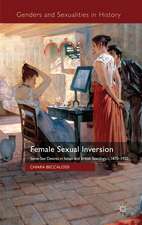Women Political Leaders and the Media: Palgrave Studies in Political Leadership
Autor D. Campusen Limba Engleză Hardback – 21 ian 2013
| Toate formatele și edițiile | Preț | Express |
|---|---|---|
| Paperback (1) | 378.34 lei 6-8 săpt. | |
| Palgrave Macmillan UK – 2013 | 378.34 lei 6-8 săpt. | |
| Hardback (1) | 384.86 lei 6-8 săpt. | |
| Palgrave Macmillan UK – 21 ian 2013 | 384.86 lei 6-8 săpt. |
Din seria Palgrave Studies in Political Leadership
-
 Preț: 156.72 lei
Preț: 156.72 lei - 9%
 Preț: 754.86 lei
Preț: 754.86 lei - 20%
 Preț: 690.45 lei
Preț: 690.45 lei - 18%
 Preț: 885.49 lei
Preț: 885.49 lei -
 Preț: 325.96 lei
Preț: 325.96 lei - 15%
 Preț: 630.88 lei
Preț: 630.88 lei -
 Preț: 390.63 lei
Preț: 390.63 lei -
 Preț: 392.60 lei
Preț: 392.60 lei - 15%
 Preț: 647.40 lei
Preț: 647.40 lei -
 Preț: 388.72 lei
Preț: 388.72 lei -
 Preț: 390.63 lei
Preț: 390.63 lei - 15%
 Preț: 696.35 lei
Preț: 696.35 lei - 15%
 Preț: 586.70 lei
Preț: 586.70 lei - 18%
 Preț: 785.24 lei
Preț: 785.24 lei -
 Preț: 358.34 lei
Preț: 358.34 lei - 18%
 Preț: 1004.36 lei
Preț: 1004.36 lei - 18%
 Preț: 892.90 lei
Preț: 892.90 lei - 18%
 Preț: 786.98 lei
Preț: 786.98 lei -
 Preț: 451.87 lei
Preț: 451.87 lei - 9%
 Preț: 691.29 lei
Preț: 691.29 lei - 9%
 Preț: 791.83 lei
Preț: 791.83 lei - 18%
 Preț: 953.65 lei
Preț: 953.65 lei -
 Preț: 464.06 lei
Preț: 464.06 lei -
 Preț: 391.22 lei
Preț: 391.22 lei
Preț: 384.86 lei
Nou
Puncte Express: 577
Preț estimativ în valută:
73.65€ • 76.80$ • 61.21£
73.65€ • 76.80$ • 61.21£
Carte tipărită la comandă
Livrare economică 21 martie-04 aprilie
Preluare comenzi: 021 569.72.76
Specificații
ISBN-13: 9780230285286
ISBN-10: 0230285287
Pagini: 147
Ilustrații: VII, 147 p.
Dimensiuni: 140 x 216 x 15 mm
Greutate: 0.34 kg
Ediția:2013
Editura: Palgrave Macmillan UK
Colecția Palgrave Macmillan
Seria Palgrave Studies in Political Leadership
Locul publicării:London, United Kingdom
ISBN-10: 0230285287
Pagini: 147
Ilustrații: VII, 147 p.
Dimensiuni: 140 x 216 x 15 mm
Greutate: 0.34 kg
Ediția:2013
Editura: Palgrave Macmillan UK
Colecția Palgrave Macmillan
Seria Palgrave Studies in Political Leadership
Locul publicării:London, United Kingdom
Cuprins
Introduction Gender and Models of Leadership Power: A Male Concept? The Female Style of Leadership Transformational Leadership The Media and Representation of Leadership The Mediatization and Personalization of Politics Popular Culture and Leadership New Media, New Leaders? Media Coverage of Women Leaders Visibility: Quantity and Quality of Coverage of Women Leaders Taking Care and Cleaning Up: Lights and Shadows of the Positive Stereotypes Viability and Horse Race: Are the Media Educating Future Female Leaders? The Double Bind The Nature of the Femininity-Competence Double Bind Iron Ladies and Mothers of the Nation When Women Leaders Are Too Feminine: The Case of Ségolène Royal When Women Leaders Are Too Strong: The Case of Hillary Clinton The Appearance of Power Women Leaders and the Personal Factor The Dress Code of Women Leaders Power and Seduction The Family Factor The Good Wife and the Good Mother Going Personal for Women Leaders Dynastic Politics: When Daughters and Wives Enter Politics Conclusion: In Search of a New Style of Political Leadership The Crisis of Traditional Democratic Leadership Time for Degendering Leadership Media as Agents of Transformation References
Recenzii
Women Political Leaders and the Media provides a timely and erudite examination of women politicians and the challenges posed by the modern media. It takes the study of political leadership a step forward deepening our understanding of the conflicting pressures women face from the media. Drawing on primary and secondary sources it lays bare the widespread stereotyping process at work in contemporary democracies and its consequences for women leaders. The book's findings are then contextualised in respect to the latest theories of political leadership. This is a highly readable and insightful book which provides a welcome addition to both political communication research and the growing literature on women political leaders.
- James Stanyer, Department of Social Sciences, Loughborough University, UK
Rich and well documented book that attempts to answer new questions emerging today in many democratic regimes. Are female qualities compatible with leadership and is the popularization of political communication fostering the possibility for women to become leaders? Looking at different cases all around the world and supported by a good knowledge of the existing literature Donatella Campus suggests answers that could also be applied to the relationship between leadership and mass media more in general.
- Paolo Mancini, Faculty of Political Science, University of Perugia, Italy
Donatella Campus, one of the most prominent Italian searchers in political communication, produces here a provocative scholarly opus. Using an exhaustive multidisciplinary knowledge, added to an excellent pragmatic understanding of the field, she comes out with strong ideas. Could it be that the increased personalization of modern political communication will lead to a better acceptance of women as irrefutable political leaders? Could it also be that leveling women politicians to their male equivalents will help to redefine and to reinforce the democratic process?
Philippe J. Maarek, University of Paris East, France
- James Stanyer, Department of Social Sciences, Loughborough University, UK
Rich and well documented book that attempts to answer new questions emerging today in many democratic regimes. Are female qualities compatible with leadership and is the popularization of political communication fostering the possibility for women to become leaders? Looking at different cases all around the world and supported by a good knowledge of the existing literature Donatella Campus suggests answers that could also be applied to the relationship between leadership and mass media more in general.
- Paolo Mancini, Faculty of Political Science, University of Perugia, Italy
Donatella Campus, one of the most prominent Italian searchers in political communication, produces here a provocative scholarly opus. Using an exhaustive multidisciplinary knowledge, added to an excellent pragmatic understanding of the field, she comes out with strong ideas. Could it be that the increased personalization of modern political communication will lead to a better acceptance of women as irrefutable political leaders? Could it also be that leveling women politicians to their male equivalents will help to redefine and to reinforce the democratic process?
Philippe J. Maarek, University of Paris East, France
Notă biografică
DONATELLA CAMPUS is Professor of Political Science at the University of Bologna, Italy.

















